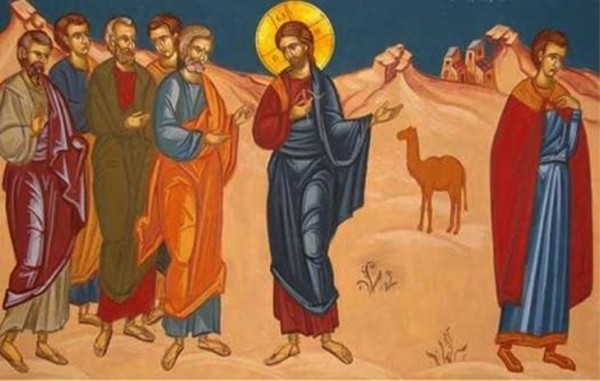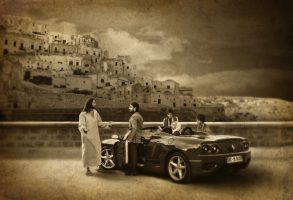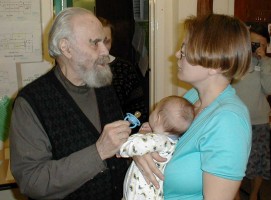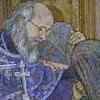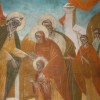Listen again to the Gospel reading that was now read; consider it carefully, for I would like to explain it to you.
And a certain ruler asked Him, saying, Good Master, what shall I do to inherit eternal life? And Jesus said unto him, Why callest thou Me good? None is good, save one, that is, God. Thou knowest the commandments, do not commit adultery, do not kill, do not steal, do not bear false witness, honour thy father and thy mother. And he said, All these things have I kept from my youth up. Now when Jesus heard these things, He said unto him, Yet lackest thou one thing: sell all thou hast, and distribute unto the poor, and thou shalt have treasure in heaven, and come, follow Me. And when he heard this, he was very sorrowful, for he was very rich. And when Jesus saw that he was very sorrowful, He said, How hardly shall they that have riches enter into the kingdom of God? For it is easier for a camel to go through a needle’s eye, than for a rich man to enter into the kingdom of God. And they that heard it said, Who then can be saved? And He said, The things which are impossible with men are possible with God” (Luke 18: 18-27).
I think that many of you are surprised by the answer of our Lord Jesus Christ to the young man who questioned him and called Him a Good Master: Why callest thou Me good? None is good, save one, that is, God.
These words sound as if the Lord were teaching people that He is not God, that it is not necessary to render Him Divine honors.
But if we think thus, then what will we say about the other parts of the Gospel, in which the Lord Jesus Christ did not forbid His Apostles from calling Him the Son of God, that is, God?
When He called Nathaniel, His future Apostle and, in his conversation with him, revealed His Divine omniscience, then Nathaniel, amazed thereby, cried out: Rabbi, Thou art the Son of God; Thou art the King of Israel (John 1:49). Christ did not forbid him to call Him the Son of God.
When the Lord Jesus Christ asked His disciples who they believed Him to be, then Peter answered: Thou art Christ, the Son of the living God. And Christ not only did not forbid him to call Him this, but said: Blessed art thou, Simon Bar-jona: for flesh and blood hath not revealed it unto thee, but my Father Which is in heaven (Matthew 16:16-17).
But even more than that, we read in the Gospel that the Lord, in the presence of all the people in the synagogue, more than once directly called Himself God. There, when He was once surrounded by scribes and Pharisees who demanded that He reveal Who He was, answered: From the beginning, I Am (John 8:25).
Who is from the beginning, except God alone? By this reply, He called Himself God.
Another time He said even more precisely to His questioner: I and My Father are one (John 10:30). Is this not a declaration of Himself as God? I am one with My Heavenly Father. This answer so outraged those listening that they picked up stones in order to stone Him for blasphemy. But Jesus told them: Is it not written in your law, I said, Ye are gods? (John 10:34). If He called gods those to whom the Word of God had come – and Scripture cannot be broken – say ye of Him, Whom the Father hath sanctified, and sent into the world, Thou blasphemest; because I said, I am the Son of God? (John 10:36), and they put down their hands that were holding the stones…
How then can we explain that the Lord Jesus Christ permitted His disciples to call Him the Son of God, that He Himself openly called Himself God, One with the Father, and existing from the beginning – but he stopped this young man who was questioning Him and addressing Him with the words “Good Master,” by saying: Why callest thou Me good? None is good, save one, that is, God, thereby, as it were, directly rejecting His Divinity, prohibiting him from calling him God, or even to call Him good?
How do we explain this? With my meager mind, I will attempt to explain this to you.
This means that it is one thing to allow His disciples, His Apostles, privately moreover, to call Him the Son of God; and another thing to call Himself one God with the Father, existing from the beginning; and another thing to allow everyone to call Him by the Divine name.
What would have happened if the Lord Jesus Christ had not hindered anyone from the crowd, such as was this young man, who addressed the Lord to call Him by that name which belongs to God alone?
What would have happened? It would have been very bad. His many enemies and all those who did not believe in Him would have immediately accused Him, from the very beginning, of the fact that He allowed Himself to be called God. This would have called forth the hatred and bitterness of His enemies; it would have prevented many from following Him, being instructed by His miracles, and believing in Him. It would have been a difficult, essential hindrance to Christ’s great work. That which could have been acceptable and could have brought forth good fruits at one time, could have been harmful in other times and in other circumstances.
In the beginning of His ministry, the Lord Himself did not call Himself the Son of God, and if He did not object when the Apostles called Him the Son of God, this was only among the Apostles, only between Him and the Twelve Apostles, but not among the people; this was not known to the people and could not tempt anyone.
The Lord Jesus openly called Himself existing from the beginning and one with the Heavenly Father only at the end of His ministry, when the time had come for this.
This is how we should understand the Lord Jesus Christ’s reply: Why callest thou Me good? None is good, save one, that is, God.
You have just heard the rest of the conversation with the young man. To his question, the Lord reminded him of the commandments given by Moses on Mount Sinai. The young man replied that he had kept and fulfilled all these commandments from his very earliest youth. What do I lack? Hearing this, the Lord said to him: you still lack one thing: sell all thou hast, and distribute unto the poor, and thou shalt have treasure in heaven, and come, follow Me.
The young man lowered his head and walked away, for he was very rich, and did not want to, and could not, fulfill this commandment of Christ.
Then the Lord, turning to the disciples and the people, said: How hardly shall they that have riches enter into the kingdom of God? For it is easier for a camel to go through a needle’s eye, than for a rich man to enter into the kingdom of God.
This answer amazed and surprised all those listening, even the Apostles, and they asked: Who then can be saved? And He said, The things which are impossible with men are possible with God.
How can we explain the Apostles’ question? Only by the fact that the ancient Jews considered riches to be God’s blessing; and people who had been awarded riches, this blessing of God, were considered pleasing to God and righteous – and suddenly the Lord says that the rich cannot enter the Heavenly Kingdom…
The Lord answered: The things which are impossible with men are possible with God.
How can we explain these words of Christ: why did He say that the rich cannot enter the Kingdom of Heaven, just as a camel cannot pass through the eye of a needle?
I think that the explanation can be found only in the fact that the rich who do not part with their riches among the poverty and misery surrounding them, who do not part with their riches to help the perishing, are opposed to God for their lack of mercy and therefore entry to the Kingdom of Heaven is closed to them. But if, Christ adds, that which is impossible for man is possible to God, this means that God can correct a merciless heart with a single of His words, for we know of many examples of how the word of God shook the hearts of people and radically changed their way of life. There are many striking examples in the lives of saints. I will cite only the account of the extraordinary St. Anthony the Great.
Once in church he heard today’s Gospel reading, heard the requirement to sell and give away to the poor one’s property – and he was the son of very rich parents, who had given him an excellent education and left him the extraordinary legacy of their possessions – and nonetheless, without consideration or hesitation, he fulfilled Christ’s command. Giving everything to the poor, he himself left for the wild African desert, where he labored for many decades. He fought with the demons, with the devil himself, and attained great spiritual perfection, becoming someone that could be called an angel in the flesh.
Let this serve as an example for us. Although there are no rich people among us, we do have at least some prosperity, and this should not be an excuse for us. We should remember Anthony the Great and, to the extent we can, fulfill Christ’s requirements by distributing our possessions to the indigent.
May our Lord and God Jesus Christ help us therein.
Amen.
December 20, 1953.
Translated from the Russian.












